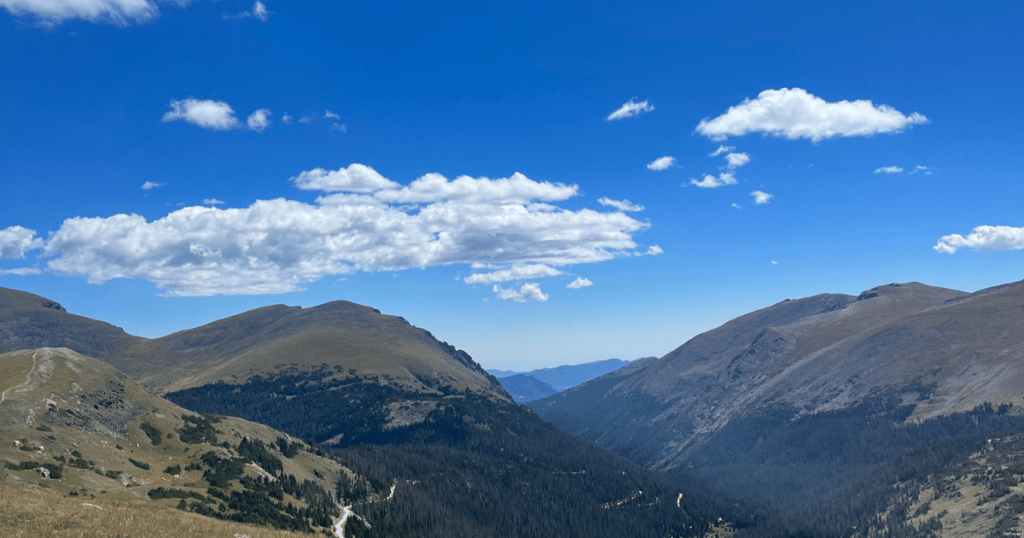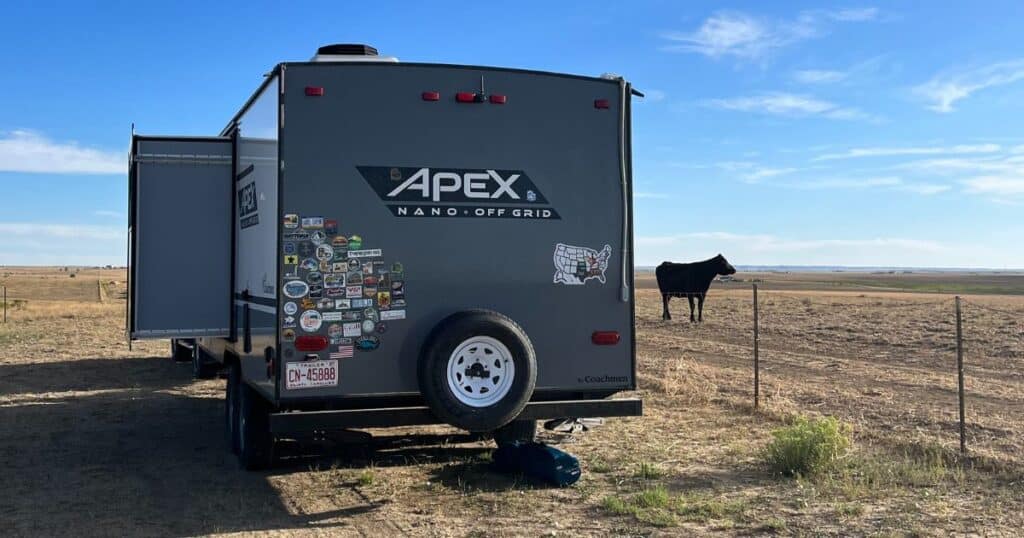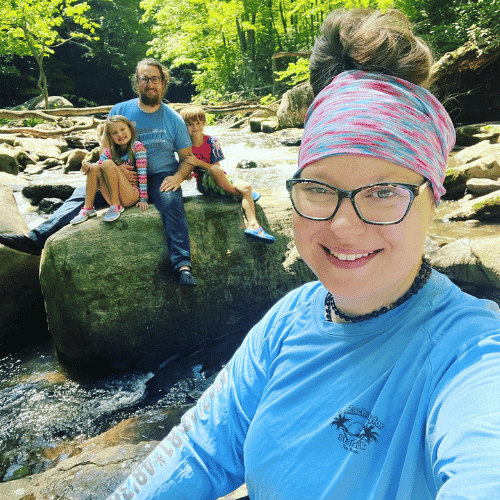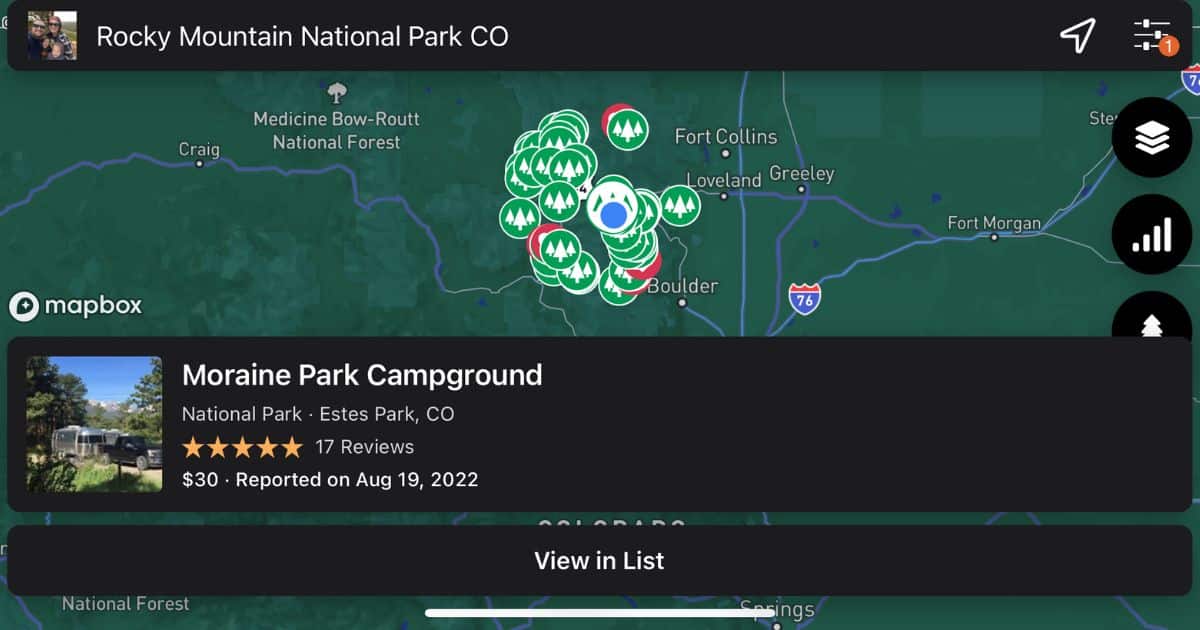To say that RV boondocking involves a lot of logistical challenges would be an understatement. Finding places where you can camp off the grid safely, legally, and without damaging your rig requires a ton of research.
Thankfully, there are many free boondocking apps and websites (and a couple paid membership programs) that we think are definitely worth the investment. Here’s some information on the tools we use most frequently while camping off the grid.
Free Boondocking Apps
One of the reasons that we choose to boondock is because it helps us save money while traveling. That’s why we love that the best apps for RV boondocking don’t cost us a penny. We use these 3 boondocking apps when looking for free campsites, planning routes, and learning more about the areas we’ll be visiting:
Campendium
Campendium has been one of our favorite boondocking apps for a long time. It’s great for finding all kinds of campgrounds, not just RV boondocking sites.
Some of our favorite features of the Campendium app are:
- Wide range of filters (free campsites, public lands, hookups offered, etc.)
- Ratings and reviews (including pictures) from other travelers help us understand whether our rig is likely to be able to get into a boondocking spot that’s listed
- Ability to search for parking sites and RV dump stations
- If cellular networks are important to you, the Pro version of the app let’s you see cell coverage
iOverlander
Another awesome resource is the iOverlander boondocking app, which is a nonprofit organization run almost entirely by volunteers. It’s great for getting firsthand reviews of campsites other travelers have enjoyed.
Some of our favorite features of the iOverlander app are:
- Clean design showing nearby campsites in either a map or list view
- Ability to search for specific amenities (like showers and laundromats)
- You can use the app to find places even when you’re offline (in list view; map view doesn’t work offline)
- Plus, find hotels, hostels, and restaurants for those times when you need a little more convenience
Avenza Maps
If you’re planning to camp off the grid in national forests, then you really need to download the free Avenza Maps app. There are some maps available on the app that you have to pay for, but most of the national forest maps are available completely free of charge. While not exclusively a boondocking app, it’s definitely on our must-have list.
Some of our favorite features of the Avenza Maps app are:
- Free offline downloads of national forest maps, which clearly mark forest roads, dispersed camping roads, and more
- Even while you’re offline, the app locates your coordinates on the map, so you can stay location aware
- Find the coordinates for places you’re interested in visiting simply by scrolling over them on the map
- Drop pins to save the places you’re interested in

Get the monthly newsletter.
Spam sucks. So don’t expect any from us! Once a month, we’ll send you personal stories and photos from our travels to inspire you to get wild.
Free Boondocking Websites
Another way we get information to help us make off-grid camping plans is through free resources available online. Here are a few of the websites we have bookmarked for RV boondocking research:
US Forest Service
If your version of boondocking includes dispersed camping in the US’s national forests, then you absolutely have to pay attention to the US Forest Service website. They publish important guidelines to keep in mind for a safe, legal and responsible off-grid camping experience.
On the US Forest Service website, you can search for any national forest and learn more about their dispersed camping opportunities, find contact information, and view important closures and other notices. Every forest has it’s own webpage (like this example from the Arapaho & Roosevelt National Forest).
Bureau of Land Management
Similarly, the Bureau of Land Management (BLM), a government agency that manages public lands and resources from National Conservation lands to fish and wildlife habitat, offers plenty of opportunities for RV boondocking (especially out west).
If you’re planning to camp off the grid on lands managed by BLM, make sure you visit their website for all the information you’ll need.
Freecampsites.net
Similar to many of the apps listed above, freecampsites.net is a user-generated resource for finding free campsites. On this website, you can add reviews of campsites you’ve stayed at, read reviews from other campers, and even plan trips and routes.
Here are a few of the features we love most about this website:
- Filter camping results based on the access road of the site (i.e. paved, dirt, 4×4)
- Search for campgrounds that offer certain amenities or activities
- Plan routes based on campgrounds you find by adding stops to your map
RVDumps.com
Okay, this resource isn’t actually for finding RV boondocking sites. But I had to include it on this list because, let’s face it: when you’re camping off the grid, you need a safe place to get rid of your waste water and sewage. We use the map below from RVDumps.com regularly during our travels.
Boondocking Membership Programs
If you have some extra money in the budget and plan to go RV boondocking for at least a year, there are a few awesome membership programs with useful boondocking apps to consider. Here are two of our favorites:
Harvest Hosts
Harvest Hosts was the first (and only) membership program we invested in when we started traveling full time. With a Harvest Hosts membership, you can use their boondocking app to find hosts that are willing to let you stay on their property for free for one night (in exchange for making a purchase of $20 or more with their business).
We’ve stayed at a wide variety of places with Harvest Hosts, including alpaca farms, produce farms, goat farms, restaurants, museums, breweries, wineries and community centers. It feels good to be able to support small businesses in the local communities we visit, and we walk away with something tangible after a night of free camping.
For us, the $99 annual membership is completely worth it. If it sounds like your kind of thing too, use our referral link to subscribe and we’ll earn a small commission (thanks for your support; it helps us produce more content like this!).
Boondockers Welcome
Harvest Hosts recently acquired Boondockers Welcome. This membership programs works similarly to Harvest Hosts, except you aren’t obligated to make a purchase from your hosts. The goal of Boondockers Welcome is to help RVers and hosts form meaningful connections and find beautiful places to camp.
If you bundle Harvest Hosts and Boondockers Welcome memberships together, you’ll save $29 (at the time of this writing). Boondockers Welcome on its own costs $79/year, but when you add it to an existing Harvest Hosts membership, you pay just $50 more annually.
Full transparency: we aren’t members of boondockers welcome (yet!) because we haven’t felt the need to have access to 3,000 more locations (Harvest Hosts meets our needs). But, with perks like being able to stay at many locations for up to 5 nights (instead of just a single night at Harvest Hosts locations) and having occasional access to electricity, we’re seriously considering it.

We hope these resources will make planning your upcoming RV boondocking trips simpler and more fun. Do you have another resource you think our community should know about? Tell us about your favorite off-grid camping websites and boondocking apps in the comments!


